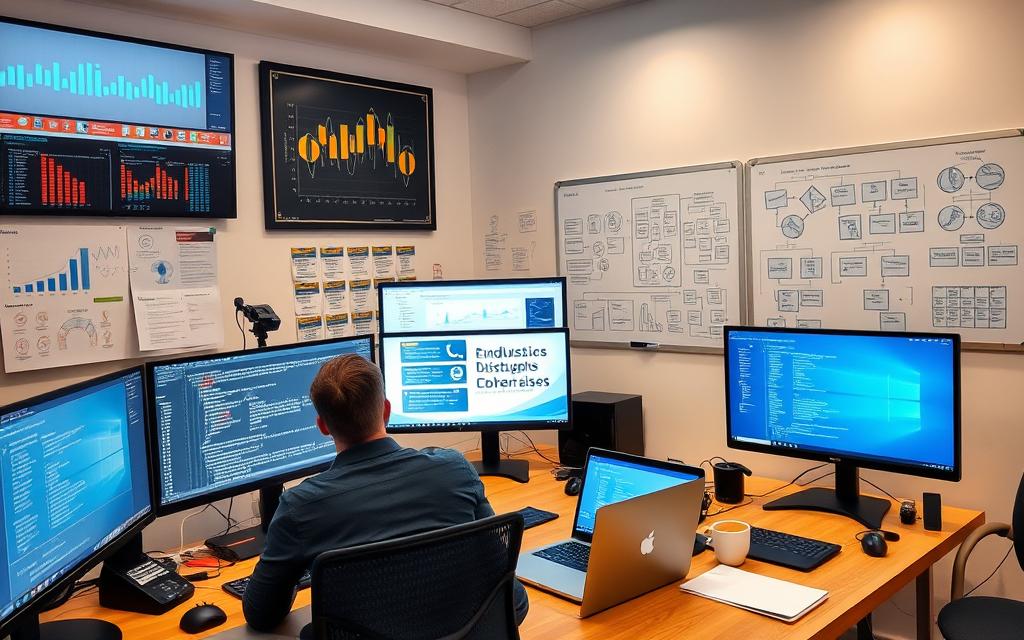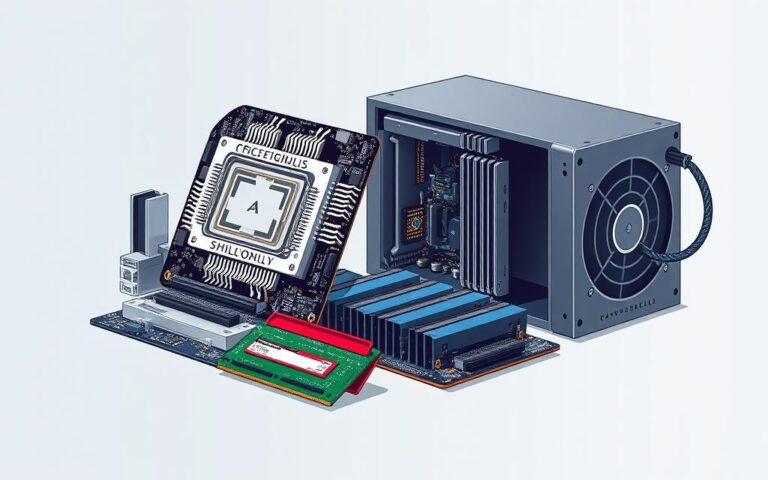What Does a Computer Systems Analyst Primarily Do?
A computer systems analyst is key in boosting a company’s IT effectiveness. They work out how to make information technology systems better. By looking at current business methods, they find what needs enhancing.
They use their tech know-how and business insights to match technology with the company’s goals. This leads to a more efficient workplace. Their job includes advising managers and making changes that better the user experience.
Understanding the Role of a Computer Systems Analyst
A computer systems analyst brings together tech knowledge and strategic thinking. They’re key for making business work better. By merging IT and business goals, they help align technology with what the organisation wants. They spot and fix system problems, making things run smoother.
Definition and Overview
Computer systems analysts dig into how IT fits in an organisation. They look at what users need and how current tech works. Then, they suggest ways to make things better. They need deep tech know-how and must understand business needs too. They also keep up with new tech trends, giving great advice to businesses.
Importance in Business Operations
These analysts make a big difference in how well a business does. By reviewing and suggesting changes, they make work flows better. This helps businesses adapt fast and stay ahead. Their insights lead to top-notch performance in a cutthroat world.
Key Responsibilities of a Computer Systems Analyst
Computer systems analysts play a crucial role in today’s businesses. They offer IT advice to ensure technology meets company goals. They work with management and stakeholders to keep technology in line with business aims.
Consulting with Management
Consulting with management is key. Analysts identify business goals during this process. They suggest technology improvements to boost efficiency.
Analysts show how IT solutions can solve issues. They ensure technology supports business growth.
Analysing Business Processes
Analysing business processes is another important task. This highlights where technology can help. Analysts provide plans for smoother operations and new tech integration.
Their insights are crucial for successful tech use. They help in making operations smoother.
Implementing New Systems
Implementing new systems is a big part of their job. It involves setting up software and hardware. They also train users and write helpful guides.
These steps make sure technology improves business tasks. This highlights the analyst’s important role in IT strategy.
| Aspect | Description |
|---|---|
| Consultation | Engage with management to align technology with business objectives. |
| Process Analysis | Examine existing workflows to identify inefficiencies and recommend solutions. |
| System Implementation | Configure, train, and support users in adopting new technology. |
The need for computer systems analysts is increasing. Job openings each year show a strong market. They are vital for linking technology and business strategies. Learn more about this career and its changing duties here.
The Daily Activities of a Computer Systems Analyst
A computer systems analyst’s day is filled with different tasks. Their main focus is teamwork across various groups. They are key in making sure IT runs smoothly and users get the help they need. Their days are well-planned. This helps them solve problems effectively.
Team Collaboration
Working together is crucial for analysts. They start by checking emails and messages to stay in sync with the team, stakeholders, and clients. In daily meetings, they discuss what they are working on, their plans, and any important issues. Sharing information like this makes the team work better together.
- Engaging in requirement gathering sessions with stakeholders helps in developing new projects or enhancing existing systems.
- Working closely with developers and project managers provides insights that lead to maintaining operational efficiency.
- Collaboration ensures all team members are aware of the system statuses and can address any potential issues proactively.
Management of User Issues
Handling user issues is key for a computer systems analyst. They give top priority to support tickets, solving staff’s technical problems directly. This hands-on method is crucial for keeping IT in top shape. It lets the organisation concentrate on its main goals.
| Activity | Description |
|---|---|
| Incident Response | Analysts respond to incidents reported by users, aiming for swift resolution. |
| Standard Operating Procedures | Refining and following these procedures allows for consistent handling of user support tasks. |
| Feedback Gathering | Analysts collect user feedback to improve systems based on actual experiences. |

Good management of user support fixes problems fast. It also makes systems better in the long run, based on what users say and want. By putting time into these tasks, computer systems analysts help both users and the company. They make IT solutions better for everyone.
The Skills Required to Succeed as a Computer Systems Analyst
To be great as a computer systems analyst, you need special skills. These help you understand complex tech and effectively communicate between tech and non-tech people.
Technical Skills
Having technical expertise is key. You should know systems management, fix software problems, and understand coding languages like SQL. It’s crucial to keep up with tech changes. This helps you adjust and be ready for new challenges. The need for experts in business analytics and big data is growing. Organisations want people who can use data wisely for decisions. With jobs in this area expected to grow by 7% from 2019 to 2029, strong technical skills are vital for your success and growth.
Interpersonal Skills
Being good at communication matters just as much. You need to explain tech ideas in simple ways. This makes sure everyone, tech or not, gets the point. You also need to be sharp at thinking and solving problems. This helps in working out what a business needs and finding the right solutions. Listening to users and getting their feedback improves systems and makes users happy. Mixing tech know-how with people skills boosts your career prospects. Being eager to learn more is also crucial for your growth.
If you want to start or get better in this career, learn from seasoned analysts. Working with them teaches you a lot and helps you move smoothly into an analyst job. For extra tips on building a career in this exciting field, check out skills for computer systems analyst.
How to Become a Computer Systems Analyst Mostly:
If you want to be a computer systems analyst, start with a solid education. Many employers look for a bachelor’s degree in computer science, information systems, or similar areas. An associate degree might work for less competitive roles, but a bachelor’s helps a lot more. You’ll typically need to complete 36 to 42 courses that prepare you for the IT world’s challenges.
Educational Requirements
Getting professional certifications from bodies like CompTIA or ISACA is a great next step. These show your skills and dedication to staying current. As technology changes, keeping up through workshops or online courses is essential.
Certifications and Continuous Learning
Practical experience is also vital for a systems analyst. Work placements or entry-level jobs offer hands-on learning and networking opportunities. The demand for analysts is expected to rise by 10% from 2022 to 2032, so early experience is key for success in this growing sector.
Gaining Experience
FAQ
What does a computer systems analyst primarily do?
A computer systems analyst works on improving a company’s IT systems. Their goal is to make these systems more efficient. They look at the tech in use, find ways to make it better, and align IT performance with business goals.
Why is the role of a computer systems analyst important in business operations?
The job of a computer systems analyst is key because they help businesses get better. They evaluate what a company needs and how its IT can work better. This helps the company stay ahead in a competitive market.
What are the key responsibilities of a computer systems analyst?
The main duties include talking with leaders to know what the business wants to achieve. They look at business activities to spot problems. Then, they put new systems in place to make sure technology helps the company succeed.
What does a computer systems analyst’s typical daily activities involve?
Every day, they work with different teams and go to meetings about the system’s condition. They fix problems and support users. This keeps the IT setup working well.
What skills are required to succeed as a computer systems analyst?
To do well in this job, you need to know a lot about systems management and fixing software issues. Being good at talking to people and solving problems is also vital. These skills help you share complex ideas with everyone.
What educational requirements are needed to become a computer systems analyst?
You usually need a bachelor’s degree in computer science or something similar. Sometimes, an associate degree is enough for certain jobs. But most of the time, a bachelor’s degree is what employers look for.
Are certifications necessary for a computer systems analyst?
Getting certifications from places like CompTIA or ISACA can be good for your career. They show you know your stuff. This can help you move up and be more recognized in your field.
How can one gain experience as a computer systems analyst?
Starting with internships or beginner jobs is a good way to get into this career. Always learning and keeping up with new tech is key. This helps you stay relevant in an industry that always changes.















